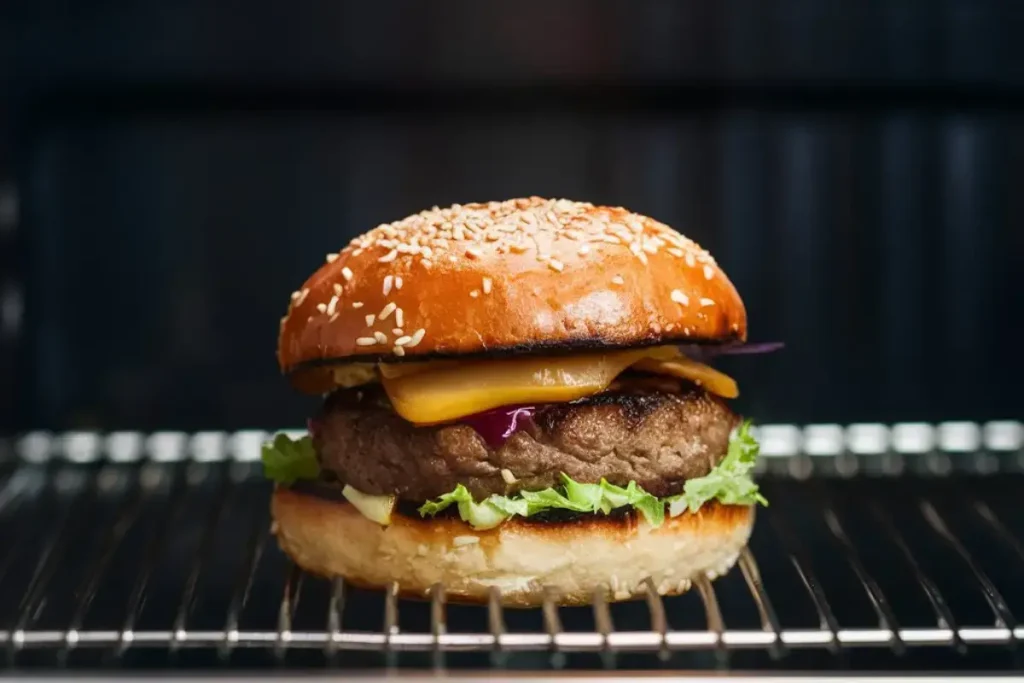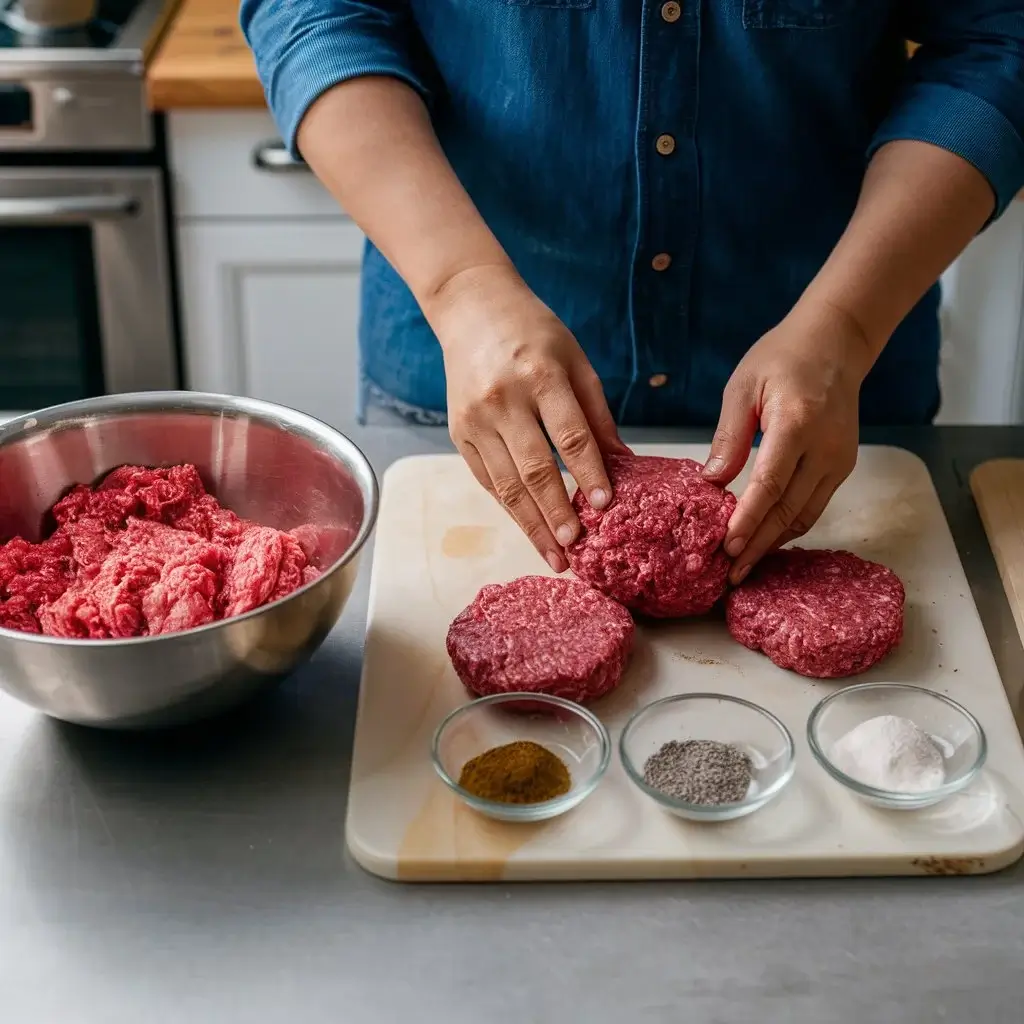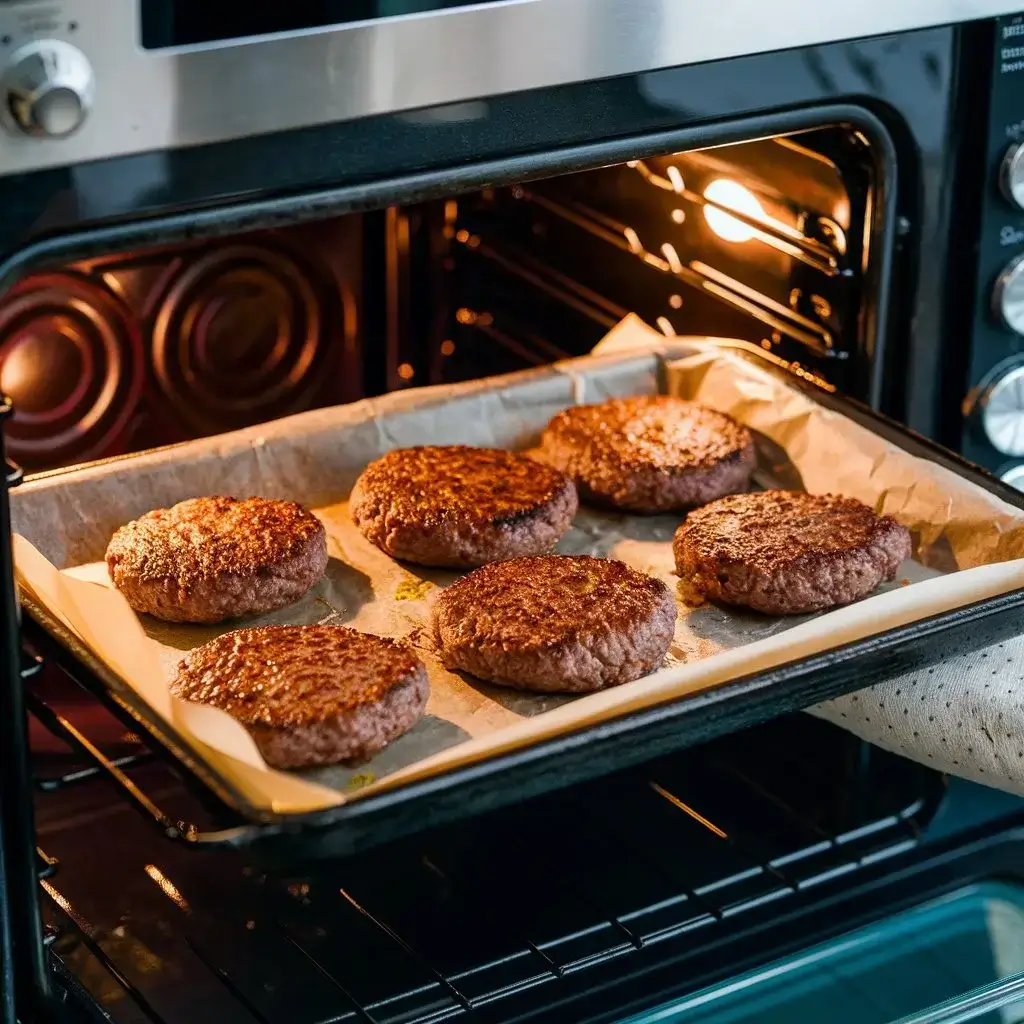Introduction to Oven-Baked Burgers
Have you ever wondered if you can cook burgers in an oven? It may not be the traditional method you think of for crafting this iconic dish, but oven-baking can be an incredibly efficient and satisfying way to prepare burgers. This technique not only simplifies the cooking process but also reduces cleanup and can even enhance the nutritional profile of your meal. In this section, we’ll explore the numerous benefits of cooking burgers in an oven and outline the essential equipment you’ll need to get started.

Benefits of Cooking Burgers in the Oven
Oven-baking burgers offers several advantages that make it a compelling alternative to traditional methods like frying or grilling. Firstly, this method is significantly healthier. Cooking burgers in an oven allows excess fat to drip away from the meat, reducing the overall fat content and calorie count of each serving. This means you can enjoy your burger with a little less guilt.
Another benefit is consistency. The oven provides a controlled environment, which means each burger cooks evenly, reducing the risk of undercooked or burnt patties. This is particularly useful when cooking for a large group, ensuring that all your guests enjoy burgers that are perfectly done.
Moreover, oven-baking is a hands-off cooking method that frees up your time to prepare other parts of your meal or entertain guests. Unlike grilling, you don’t need to stand over a hot fire, flipping burgers and dodging smoke. Just pop them in the oven, set a timer, and continue with your meal prep.
Equipment Needed for Oven-Baking Burgers
To start oven-baking your burgers, you’ll need a few basic kitchen tools. The most important piece of equipment is a baking sheet, which will serve as the base for cooking the burgers. For best results, line your baking sheet with parchment paper or a silicone baking mat to prevent sticking and make cleanup a breeze.
Additionally, consider using a wire rack on top of your baking sheet. This setup allows heat to circulate around the burgers, ensuring they cook evenly on all sides. It also helps fat drain away, enhancing the health benefits we discussed earlier.
Finally, don’t forget a meat thermometer. Ensuring your burgers reach the safe internal temperature of 160°F (71°C) is crucial for avoiding foodborne illnesses. A thermometer will help you check if your burgers are cooked through without having to cut into them, which could cause them to dry out.
With these benefits and the right equipment in hand, you’re well on your way to making delicious, oven-baked burgers that could become a new favorite in your culinary repertoire. Whether you’re cooking for a busy weeknight dinner or a casual gathering with friends, this method provides a simple yet effective way to deliver tasty, satisfying burgers.
How to Prepare Burgers for Oven Cooking
Preparing burgers for oven cooking is straightforward and can greatly impact the final taste and quality of your burgers. This section will guide you through selecting the right meat, enhancing flavor with seasonings, and forming the perfect patty for oven baking.

Choosing the Right Meat for Oven-Baked Burgers
The choice of meat is crucial for delicious oven-baked burgers. Opt for ground beef with a fat content of about 20% for the juiciest results. This fat ratio ensures that the burgers remain moist and flavorful after baking. Leaner meats can become dry, so consider your options based on the desired juiciness and flavor.
Seasoning Ideas for Enhanced Flavor
Seasoning your burgers correctly can transform them from good to great. Start with the basics: salt and freshly ground black pepper. To add depth, consider mixing in garlic powder, onion powder, or smoked paprika. For a bolder taste, you might even add a dash of cayenne or a sprinkle of dried herbs like thyme or oregano. Mix these seasonings into the meat gently to avoid overworking it.
Forming the Perfect Patty
To form the perfect patty, start by dividing your meat into even portions. Roll each portion into a ball, then flatten it into a disk. Ensure that each patty is about the same thickness, which promotes even cooking. Make a small indent in the center with your thumb to prevent the burgers from puffing up during baking. This keeps them level and ensures they cook uniformly.
By following these steps, you ensure that your oven-baked burgers are flavorful, juicy, and cooked to perfection. Each element, from meat selection to patty formation, plays a vital role in creating the ideal burger experience.
Step-by-Step Guide to Cooking Burgers in the Oven
Cooking burgers in the oven is a straightforward process that can yield delicious results. This step-by-step guide will walk you through preheating your oven, arranging the burgers on the tray, understanding optimal cooking times and temperatures, and checking for doneness to ensure your burgers are perfectly cooked.
Preheating Your Oven
Start by preheating your oven. For cooking burgers, set the oven to 400 degrees Fahrenheit (204 degrees Celsius). This temperature allows the burgers to cook thoroughly without burning, ensuring a juicy interior and a nicely browned exterior.
Arranging Burgers on the Tray
Once your oven is preheated, prepare your tray. Line a baking sheet with parchment paper or a silicone mat to prevent sticking. If you’re using a wire rack, place it on the tray now. Arrange your burger patties on the rack or tray, making sure they do not touch each other. This spacing allows hot air to circulate around each burger, cooking them evenly.
Optimal Cooking Times and Temperatures
Place the tray in the preheated oven. For medium burgers, cook them for about 15 to 20 minutes. If you prefer your burgers to be well-done, extend the cooking time to 20-25 minutes. Keep in mind that thicker patties may require additional time.
Checking for Doneness
To ensure your burgers are cooked safely and to your liking, check their internal temperature. Use a meat thermometer to measure the temperature at the thickest part of the burger. For ground beef, the safe minimum internal temperature is 160 degrees Fahrenheit (71 degrees Celsius). If the burgers haven’t reached this temperature, continue cooking for a few more minutes and check again.
By following these simple steps, you can easily prepare delicious oven-baked burgers. Remember, the key to perfect burgers lies in monitoring the cooking process and adjusting the time based on your oven and the size of your patties. Enjoy your homemade oven-baked burgers with your favorite toppings and sides!
Tips and Tricks for Perfect Oven-Baked Burgers
Perfecting oven-baked burgers involves mastering a few key techniques and understanding how to avoid common pitfalls. This section will provide essential tips and tricks to help you achieve the best results, ensuring your burgers are not only cooked properly but are also deliciously juicy.
Avoiding Common Mistakes
Firstly, avoid overworking the meat. Over-mixing the ground beef can lead to tough burgers because it develops the proteins too much. Simply mix the seasoning gently until just combined. Secondly, do not forget to preheat your oven. Putting burgers into a cold oven will lead to uneven cooking and can affect the texture adversely. Another common mistake is using meat that’s too lean. As mentioned earlier, a little fat is beneficial for flavor and juiciness—aim for a mix with at least 20% fat.
Moreover, ensure that your patties are of even thickness. This uniformity helps them cook at the same rate, preventing some burgers from becoming dry while others are still undercooked. Finally, resist the urge to flip your burgers multiple times in the oven. Set them on the tray, and let the heat do its work until it’s time to check for doneness.
How to Keep Burgers Juicy
To keep your burgers juicy, start with the right meat. A higher fat content, as suggested, helps immensely. Additionally, consider adding a small ice cube or a teaspoon of cold water in the center of each patty before cooking. This little trick helps to keep the burgers moist as the ice melts during cooking, distributing moisture throughout the patty.
Another tip is to avoid pressing down on your burgers while they cook. Pressing can squeeze out the tasty juices and lead to a drier burger. Also, after they come out of the oven, let your burgers rest for a few minutes. This resting period allows the juices to redistribute throughout the patty, ensuring a moist bite every time.
Using these tips and tricks, you can easily avoid common mistakes and keep your oven-baked burgers juicy and flavorful. By paying attention to the details, you can elevate a simple burger to a delicious meal that impresses your guests and satisfies your cravings.
Alternative Toppings and Accompaniments
When serving oven-baked burgers, the right toppings and side dishes can transform a simple meal into a memorable feast. This section explores various topping options, from classic to gourmet, and recommends some delightful side dishes that complement the flavors of your burgers.
Classic vs. Gourmet Toppings
Classic Toppings: The traditional burger is usually dressed with lettuce, tomatoes, onions, pickles, ketchup, mustard, and mayonnaise. These ingredients are beloved for their familiarity and the way they balance the richness of the meat. Cheese, such as American or cheddar, is also a staple, melting beautifully under the heat of a freshly cooked patty.
Gourmet Toppings: For those looking to elevate their burger experience, gourmet toppings offer a creative twist. Consider adding avocado slices for a creamy texture or a slice of gourmet cheese like Gorgonzola or Brie. Caramelized onions or sautéed mushrooms can add a deep, savory flavor that complements the meat. For a bit of zest, try adding arugula or a spicy aioli. Bacon jam or a fried egg can also turn an ordinary burger into a luxurious treat.
Experimenting with different combinations of these toppings can cater to all tastes, whether you prefer the comforting classics or are in the mood for something more adventurous.
Side Dishes to Serve with Oven-Baked Burgers
The right side dishes not only complement your burgers but also round out the meal. Here are some popular options:
- French Fries: A classic partner for burgers, crispy French fries are always a hit. Whether you prefer them thin and crispy or thick and fluffy, they are a delightful contrast to the juicy burger.
- Coleslaw: For a lighter side, coleslaw offers a crunchy, creamy texture that pairs well with the softness of the burger. It also provides a refreshing tang that can cut through the richness of the meat.
- Sweet Potato Fries: An alternative to regular fries, sweet potato fries bring a hint of sweetness that complements the savory burger. They’re also rich in nutrients, making them a healthier option.
- Salad: A fresh salad with a vinaigrette dressing can add a light, crisp component to your meal, balancing out the heaviness of the burger.
- Onion Rings: For those who love a bit of crunch, onion rings are a flavorful option that pairs wonderfully with any type of burger.
Choosing the right toppings and side dishes can enhance your oven-baked burgers, making each meal unique and satisfying. Whether sticking with classics or exploring gourmet options, the possibilities are endless.
Nutritional Considerations for Oven-Baked Burgers
When considering how to cook burgers, nutritional aspects play an important role, especially when asking, “Can you cook burgers in an oven?” Oven-baking burgers can significantly impact their healthiness by altering their caloric content and allowing adjustments for various dietary restrictions.
Comparing Caloric Content with Other Cooking Methods
Can you cook burgers in an oven in a way that affects their nutritional value? Absolutely. When you bake burgers in the oven as opposed to frying them or cooking them on a grill, you often reduce the amount of fat and, consequently, the calories in each serving. This is because the oven allows excess fat to drip away from the burgers, which might otherwise be reabsorbed if cooked in a pan. Grilling also allows fat to drip away, but it might require added oils that increase the caloric content. Therefore, oven-baking can be considered a healthier option, especially if you’re watching your caloric intake.
Adjusting Recipes for Dietary Restrictions
Can you cook burgers in an oven while accommodating dietary restrictions? The versatility of oven-baking makes it easier to adjust recipes to meet various dietary needs. For example, for those on a low-fat diet, choosing leaner cuts of meat or even substituting beef with turkey or chicken can make a significant difference. You can also incorporate plant-based proteins like beans or lentils for vegetarian or vegan burgers that are just as satisfying when baked in the oven.
Moreover, for those avoiding gluten, swapping traditional breadcrumbs in burger patties with gluten-free alternatives like oat flour or crushed gluten-free crackers is simple and effective. Oven-baking these adjusted recipes often retains the flavors and textures essential for a satisfying burger experience, proving that oven-baking is a versatile method suitable for various dietary needs.
By understanding these nutritional considerations, you can confidently answer “yes” to the question, “Can you cook burgers in an oven?” while also ensuring that your meals are delicious and suitable for a variety of dietary preferences.
Can You Cook Burgers in an Oven?
The question of whether you can cook burgers in an oven often arises among home cooks looking for an alternative to the traditional grilling method. The answer is a resounding yes. Oven-baking is not only feasible but also provides unique advantages that might make it preferable depending on your situation.

Pros and Cons of Oven vs. Grill
Pros of Oven-Baking:
- Consistency and Control: Oven-baking offers consistent heat, which means more uniform cooking. There’s no need to worry about flare-ups or hot spots that are common on grills.
- Convenience: Cooking burgers in an oven can be more convenient, especially in bad weather or if you don’t have outdoor space for a grill.
- Healthier Options: As mentioned, baking allows fat to drip away from the meat, potentially reducing calorie intake.
Cons of Oven-Baking:
- Flavor Differences: Some might miss the smoky flavor that grilling imparts to burgers. However, this can sometimes be mitigated with smoked spices or seasonings.
- Crust Development: Grills can produce a desirable charred crust more easily than an oven. To achieve a similar effect in the oven, you might need to broil the burgers for a few minutes at the end of cooking.
Safety Considerations When Using an Oven
When cooking burgers in an oven, there are several safety considerations to keep in mind:
- Temperature Monitoring: It’s important to ensure your oven is accurately calibrated. An oven thermometer can help verify that your settings are correct.
- Food Safety: Always use a meat thermometer to check that your burgers have reached a safe internal temperature of 160°F (71°C) to prevent foodborne illnesses.
- Handling: Use oven mitts and be cautious when handling the hot baking tray or rack from the oven.
In conclusion, not only can you cook burgers in an oven, but there are also compelling reasons to consider this method. Oven-baking can be a simpler, safer, and healthier way to prepare delicious burgers at home.
Conclusion: Embracing the Oven for Your Burgers
In conclusion, the answer to the question “Can you cook burgers in an oven?” is a definitive yes. Oven-baking burgers offers a fantastic alternative to traditional grilling, providing numerous benefits including convenience, consistency, and the potential for healthier meals. By understanding the pros and cons compared to grilling, as well as adhering to safety considerations, you can make delicious burgers in the comfort of your kitchen regardless of the weather or availability of outdoor space.
This method allows for greater control over cooking temperatures, ensures even cooking, and supports healthier cooking practices by allowing fat to drip away from the meat. Additionally, oven-baking can be adapted to accommodate various dietary needs and preferences, making it a versatile option for meal preparation.
Whether you’re a novice cook or a seasoned chef, experimenting with oven-baked burgers could open up a new dimension in your culinary repertoire. With the right techniques and a bit of creativity in seasoning and toppings, your oven-baked burgers can become a delightful and regular part of your meal planning. So next time you’re considering burgers for a meal, remember the oven offers a simple, effective, and satisfying way to cook them to perfection.
FAQs
- What temperature should burgers be cooked at in the oven?
- Burgers should be cooked in a preheated oven at 400 degrees Fahrenheit (204 degrees Celsius) to ensure they are cooked evenly and thoroughly.
- How long does it take to cook a burger in the oven?
- It generally takes about 15-20 minutes to cook burgers in the oven if you’re aiming for medium doneness. For well-done burgers, extend the cooking time to 20-25 minutes. Always use a meat thermometer to ensure they’ve reached the safe internal temperature of 160°F (71°C).
- Can you cook frozen burgers in the oven?
- Yes, you can cook frozen burgers in the oven. Adjust the cooking time, as frozen burgers will take longer to cook. Typically, add about 5-10 additional minutes, checking for doneness with a meat thermometer.
- How can you make oven-baked burgers taste like grilled?
- To mimic the smoky flavor of grilled burgers, you can add smoked paprika, liquid smoke, or barbecue sauce to your burger mix. Additionally, broiling the burgers for the last few minutes can help achieve a more charred exterior.
